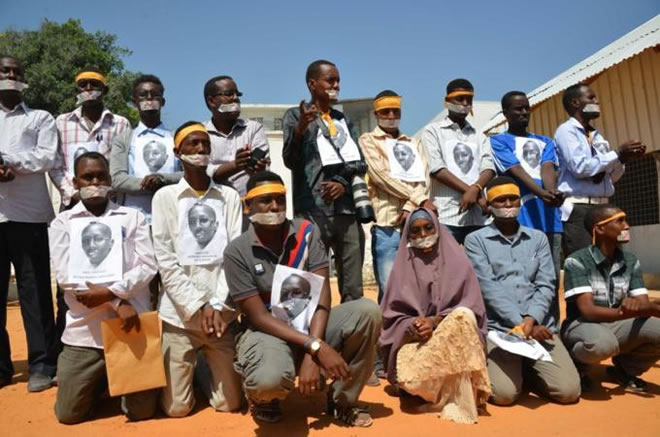
In January 2013 a Somali journalist and a rape survivor were both convicted on spurious charges for reporting a rape by Somali government forces

Wednesday, November 05, 2014
So the African Union's recent announcement that it will investigate allegations of sexual exploitation and abuse by some African Union Mission in Somalia (AMISOM) soldiers is a welcome first step. The move, prompted by a September Human Rights Watch report, could help end impunity for sexual violence.
Credible investigations could potentially lead to repatriations and prosecutions for those involved in abuses. The mere presence of investigators could deter misconduct by AU soldiers who see that commanders no longer ignore rape and sexual exploitation. A solid inquiry could improve AU policies and practice in all peace and support missions, helping the African Union to avoid the United Nations' early failures to address similar allegations.
But the AU investigators will need to navigate many obstacles, including an unrealistic timetable, persistent insecurity, and Somalia's record of intimidating women and journalists who report sexual crimes. The investigative team has until November 30 to establish whether abuses occurred, in an environment where rape survivors are understandably reluctant to speak about their experiences.
Encouraging survivors to speak - those with the most important and damning evidence - requires time, adequate resources, and political will to ensure confidentiality and safety. The investigative team needs to appreciate that recent actions of both the Somali government and some AMISOM troops have undermined the confidence of survivors of rape and sexual exploitation, and witnesses, who might step forward.
Human Rights Watch's research in Somalia over several years has documented intimidation and harassment of those seeking to disclose information about sexual crimes by men in uniform. Time and time again, women, journalists, civil society activists, and even medical doctors have told us of harassment and threats. Some examples are well-known. The January 2013 case in which a Somali journalist and a rape survivor were both convicted on spurious charges for reporting a rape by Somali government forces casts a dark shadow over any attempts to encourage women to report sexual crimes. Their convictions were later overturned, but the journalist and the woman fled the country in fear of reprisals from those shamed by the case.
In August 2013 the Somali government and AMISOM mishandled investigations into an allegation of gang rape by AU soldiers. The woman faced threats from Somali security forces while seeking much-needed medical assistance. The AMISOM board of inquiry failed to consult any independent sources, relying on interviews with AMISOM personnel at the camp where the incident occurred and a review of the camp log book. AMISOM's spokesperson publicly denied the allegations during the investigations. Almost a year later, the board's report has never been made public and again, the woman fled the country fearing for her safety.
In neither case was anyone ever held to account for the rape, despite brave survivors seeking medical help and speaking out.
Investigators are more likely to be successful now if they receive consistent and public support from the Somali government and the AU leadership, as well as from troop-contributing countries. Security forces, including Somali national forces and clan militia, should clearly understand that intimidating survivors or witnesses will bring consequences. Preparing the ground for successful investigations will also require ensuring that local leaders, Somali civil society, and the women and girls most affected understand the basic procedures of how to report an allegation and what safety measures are in place.
The AU's inclusion of women on the investigative team and the assurances that members have the requisite training and experience to conduct sensitive investigations is extremely important. But the AU and Somali officials will need to work in advance to ensure that victims and witnesses feel confident to share information. If and when survivors do step forward, the team must guarantee their confidentiality and safety. The AU staff should also work with local civil society groups - who will also need assurances of protection - and the United Nations to make medical and psychosocial support available to victims before starting their interviews.
There has been much talk of "zero tolerance" for sexual and gender-based violence in Somalia. This investigative team can take concrete steps forward in the fight against sexual exploitation and abuse. But until more women and girls can safely report abuse and get medical and psychosocial care without fear of prosecution or persecution, investigators will face a long and challenging task to uncover sexual exploitation and abuse - and sadly they may not reveal the full picture.